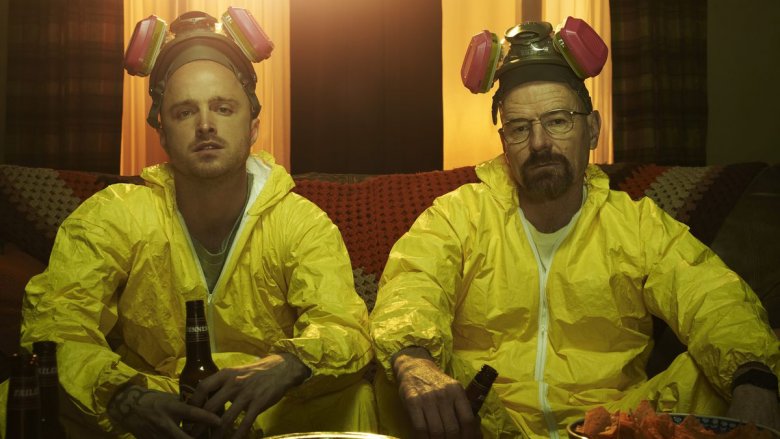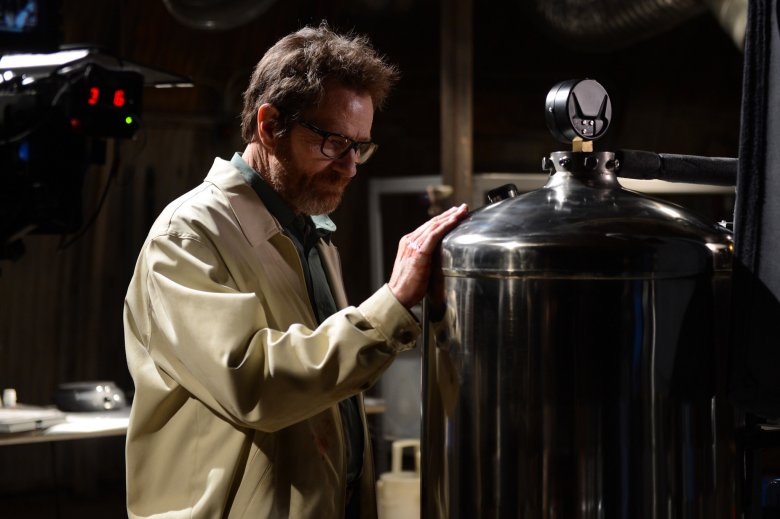This Is Why Breaking Bad Ended After 5 Seasons
Breaking Bad is one of the greatest television series of all time, a masterful exercise in plotting and character development which featured some of the finest photography and acting to ever grace the small screen. Each of its five seasons were tonally distinctive, and throughout them all, the series never sagged, or offered up even a single subpar episode. The series finale gave viewers a strong sense of closure, and it's obvious that creator Vince Gilligan had long intended to end the show after those five seasons — but fans still wonder: with such a strong cast and crew and a ravenous audience, why didn't Breaking Bad continue?
Gilligan likely wouldn't have gotten any complaints from anyone had he chosen to extend the story of high school chemistry teacher-turned meth kingpin Walter White (Bryan Cranston), but it was his experience writing for another show — one that perhaps went on a little longer than it should have — that convinced him that Breaking Bad needed to end with audiences still hungry for more.
Speaking with the press in 2018, Gilligan revealed that during his time in the writers' room for The X-Files — which enjoyed an original run of nine seasons between 1993 and 2001, and offered up truncated tenth and eleventh seasons in 2016 and 2018, respectively — he noticed that he and his peers eventually realized that they were toiling away on a show that they were no longer certain they themselves would want to watch. (via Digital Spy)
"I pushed harder than anyone for [Breaking Bad] to end when it did," Gilligan said. "You know, as someone making money on the show, in very crass, basic terms, I would have loved for it to go on forever. But I had worked on The X-Files for years before that, which was a wonderful job. I loved it."
Gilligan continued to explain that after years of working on The X-Files, he and the rest of the writing staff had found themselves toiling away on a series which no longer felt like a labor of love. "I was such a fan of the show when I got involved, and I had such a good time being a writer on it. For seven years, I was on it. Then suddenly, I looked up one day, and realized that everybody else was watching something else entirely. I learned at that point: you don't want to leave the party too late. You want to leave folks wanting more."
Gilligan then engaged in a little bit of knife-twisting, saying that Breaking Bad "could have gone a few more seasons," but that he grew concerned that prolonging the inevitable would potentially have the effect of tarnishing the legacy of one of the most consistently critically adored series ever.
"I was very anxious about the idea of folks suddenly moving on, and saying, 'Is that show still on the air? I used to watch it. It used to be good,'" he said. "I'd wanted folks rather to say, 'Don't end it now!' That's what I wanted, and that's what we got, thank goodness. So it was me as much as anybody who said, 'I want to leave the stage at a high point, and not go past the high point.'"
The creator also revealed that if it had been up to production studio Sony, Breaking Bad would indeed have made it well past five seasons — and, for that matter, that a different studio might have forced his hand.
"There was a little bit of pressure from [Sony], saying... not pressure, but the hope expressed by them: 'Can you go a little longer? We're only now starting to make money on this thing.' So they were very understanding, actually. I have to give them great credit. Some other companies probably would have said, 'If you don't do this, someone else will. We're going to keep this thing going.' But [Sony was] wonderful to work with."
Of course, we now know that Breaking Bad isn't entirely over. A sequel film, focusing on White's beleaguered partner Jesse Pinkman (Aaron Paul), is currently in production — and the main question on fans' minds, one which has yet to be answered, is whether Cranston will make an appearance in any capacity. It's worth noting, though, that Cranston wouldn't have landed his signature role in the first place if not for The X-Files.
Gilligan decided to cast Cranston, who was previously best-known for the role of bumbling dad Hal on the Fox sitcom Malcolm in the Middle, based on the actor's work in the sixth-season X-Files episode "Drive," which aired in 1998, shortly before Malcolm's debut. Speaking with New York magazine in 2009, Gilligan said of his star, "We needed a guy [for "Drive"] who could be scary and kind of loathsome but at the same time had a deep, resounding humanity. When Malcolm went on the air, I was like, 'Oh my God, I didn't realize he could be so funny!'"
Based on these remarks, it's easy to see why Gilligan had his heart set on casting Cranston in a series which would become one of the most fascinating, complex character studies ever created. Fans may have been left with a hole in their hearts when the series ended, but even they would have to admit that Breaking Bad was a series that never got the chance to run out of steam — which was exactly as its creator intended.

